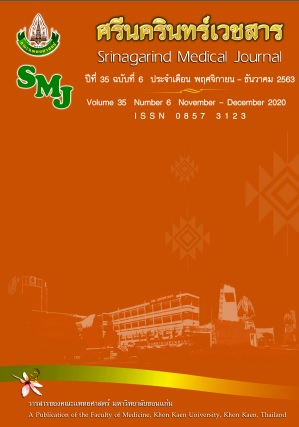The Effect of Overnight Fasting on Stroke Volume Index Measured by Whole Body Impedance Cardiography
Abstract
ผลของการงดน้ำงดอาหารต่อค่า Stroke Volume Index เมื่อวัดโดย Whole Body Impedance Cardiography
ศิวพร เติมพรเลิศ1, อรลดา ฉั่วสุวรรณ์2, พรภัทรา อารีรักษ์1, ธนิต วีรังคบุตร1*
1ภาควิชาวิสัญญีวิทยา คณะแพทยาศาสตร์ โรงพยาบาลรามาธิบดี มหาวิทยาลัยมหิดล
2ภาควิชาวิสัญญีวิทยา คณะแพทยาศาสตร์ สถาบันการแพทย์จักรีนฤบดินทร์ มหาวิทยาลัยมหิดล
หลักการและวัตถุประสงค์: ผู้ป่วยที่เข้ารับการระงับความรู้สึกและผ่าตัดควรงดน้ำงดอาหารในระยะเวลาที่เหมาะสมเพื่อป้องกันการเกิดภาวะปอดอักเสบจากการสำลัก การงดน้ำงดอาหารก่อให้เกิดภาวะพร่องสารน้ำในร่างกาย การให้สารน้ำทดแทนทางหลอดเลือดดำเพื่อแก้ไขภาวะพร่องสารน้ำสามารถป้องกันภาวะความดันโลหิตต่ำระหว่างการระงับความรู้สึก แต่การให้สารน้ำมากเกินความจำเป็นก่อให้เกินผลเสีย ปัจจุบันยังไม่สามารถสรุปชัดเจนเกี่ยวกับผลของการงดน้ำงดอาหารต่อสภาวะของสารน้ำในร่างกายที่เปลี่ยนแปลงไป ที่ผ่านมายังไม่มีการศึกษาวัดสภาวะของสารน้ำในหลอดเลือดหลังการงดน้ำงดอาหารโดยใช้ whole body bioimpedance cardiography ซึ่งเป็นอุปกรณ์ที่ไม่รุกราน ใช้ง่าย และค่าที่วัดได้ไม่ขึ้นกับผู้วัด ความน่าเชื่อถือของค่าที่วัดได้จาก whole body bioimpedance cardiography เทียบเท่า pulmonary artery thermodilution ซึ่งเป็นวิธีมาตรฐาน ในการศึกษานี้ใช้ whole body bioimpedance cardiography วัดค่าปริมาตรเลือดที่ถูกสูบฉีดออกจากหัวใจในการบีบตัวหนึ่งครั้งต่อพื้นที่ผิวกาย (stroke volume index, SVI) ก่อนและหลังงดน้ำงดอาหารเป็นเวลา 8 ถึง 10 ชั่วโมง
วิธีการศึกษา: ศึกษาในอาสาสมัครอายุ 18-65 ปี American society of anesthesiologists (ASA) physical status 1-2 ใช้อุปกรณ์ whole body bioimpedance วัดค่า SVI และ hemodynamic parameters อื่นๆก่อนและหลังงดน้ำงดอาหาร โดยเปรียบเทียบความแตกกต่างค่า hemodynamic parameters ก่อนและหลังงดน้ำงดอาหารหากมากกว่าร้อยละ 10 ถือว่ามีนัยสำคัญทางคลินิก ค่า p < 0.05 ถือว่ามีนัยสำคัญทางสถิติ
ผลการศึกษา: อาสาสมัครเข้าร่วมวิจัยจนสิ้นสุดจำนวน 62 ราย SVI ก่อนและหลังงดน้ำงดอาหารมีค่า 40.0±8.7 มล.ต่อตร.ม. และ 37.7±8.2 มล.ต่อตร.ม. ตามลำดับ โดยมีค่าลดลงร้อยละ 5.5 ค่าร้อยละของการเปลี่ยนแปลง SVI ในผู้เข้าร่วมวิจัยแต่ละรายมีค่าอยู่ในช่วงตั้งแต่ เพิ่มขึ้นร้อยละ3.1 ถึง ลดลงร้อยละ17.0 มีผู้เข้าร่วมวิจัยจำนวน 12 ราย (ร้อยละ 19.4) มีค่า SVI ลดลงมากกว่าร้อยละ 10 ค่า stroke volume (SV), cardiac output (CO) and cardiac index (CI) มีค่าลดลงร้อยละ 5.6, 6.6 และ 6.4 ตามลำดับ ค่า hemodynamic parameters ทุกตัวยกเว้นอัตราการเต้นของหัวใจมีค่าลดลงแบบมีนัยสำคัญทางสถิติ แต่ลดลงน้อยกว่าร้อยละ 10
สรุป: การงดน้ำงดอาหารไม่มีผลเปลี่ยนแปลงค่า SVI ทางคลินิกเมื่อวัดโดย whole body impedance cardiographyในประชากรที่มีสุขภาพแข็งแรง ผู้เข้าร่วมวิจัยบางรายมีค่า SVI ลดลงอย่างมีนัยสำคัญหลังการงดน้ำงดอาหาร และการให้สารน้ำทางหลอดเลือดดำในปริมาณที่เหมาะสมน่าจะช่วยเพิ่มอัตราการไหลของเลือดออกจากหัวใจ (cardiac output)
Keywords : ปริมาตรเลือดที่ถูกสูบฉีดออกจากหัวใจในการบีบตัวหนึ่งครั้งต่อพื้นที่ผิวกาย; การงดน้ำงดอาหาร; ภาวะพร่องสารน้ำ
Background and Objecitve: Preoperative fasting is recommended to prevent pulmonary aspiration. Fasting induces hypovolemia. Intravenous fluid infusion is commonly given during anesthesia to minimize the risk of hypotension. However, intravenous fluid overload has been shown to deteriorate patient outcome. From previous literatures, the effect of preoperative fasting on intravascular volume is still inconclusive. There is no previous study that assesses intravascular volume status before and after fasting using the whole body impedance cardiography which is a non-invasive, practical and operator-independent. The reliability of whole body impedance cardiography is comparable to pulmonary artery thermodilution which is gold standard. In this study, we assessed stroke volume index (SVI) before and after fasting for 8 to 10 hours using whole body impedance cardiography.
Methods: This is prospective observational study. We included volunteers with American society of anesthesiologists (ASA) physical status classification I–II with age between 18-65 years old. SVI and other hemodynamic parameters were measured before and after fasting using whole body impedance cardiography. The absolute change of hemodynamic parameters before and after fasting more than 10% indicated clinical significance. P value < 0.05 indicates statistical significance.
Results: Sixty-two volunteers were enrolled and completed the study. SVI before and after overnight fasting were 40.0±8.7 mL/m2 and 37.7±8.2 mL/m2, respectively. SVI after fasting was decreased 5.5%. The percentage absolute change of SVI in individual volunteer was in a range between 3.1% to -17.0%. Twelve subjects (19.4%) have decreased in SVI. Stroke volume (SV), cardiac output (CO) and cardiac index (CI) were decreased 5.6%, 6.6% and 6.4%, respectively. All hemodynamic parameters except heart rate were statistically decreased after fasting (p-value < 0.05) but the absolute change less than 10%.
Conclusion: Overnight fasting does not clinically affect SVI measured by whole body impedance cardiography in healthy population. Some volunteers have significantly decreased in SVI after fasting and appropriate intravenous fluid therapy probably improves CO.
Keywords: Whole body impedance cardiography; stroke volume index; fasting, hypovolemia


